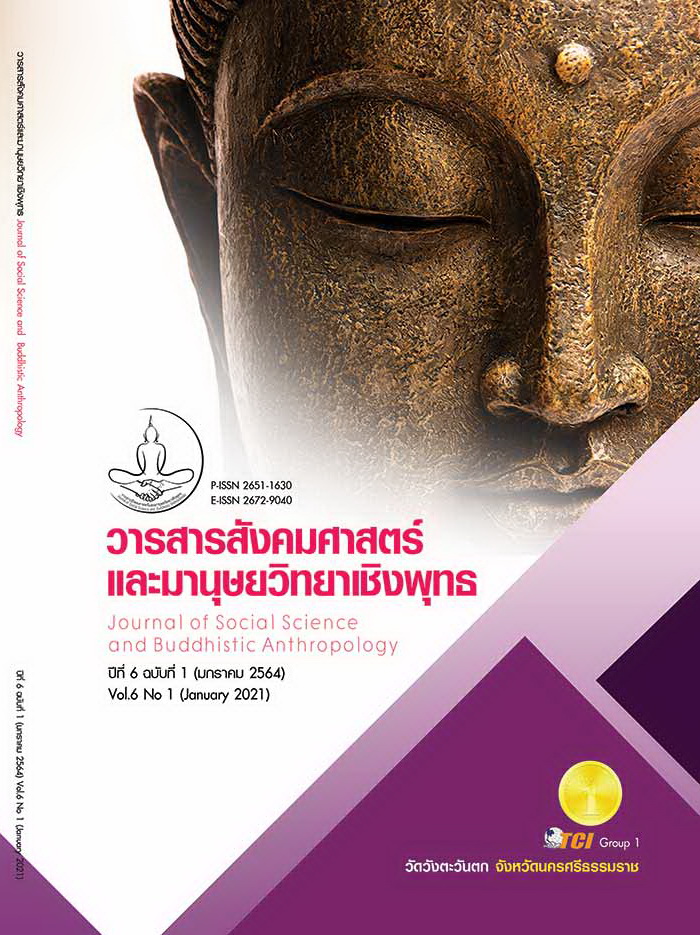GUIDELINES IN COMMUNITY-BASED TOURISM MANAGEMENT AIMING TO FEEL THE PRESENCE OF ETHNICITY THROUGH CULTURAL WAY OF LIFE OF MON 12-MONTH TRADITION IN SANGKHLABURI DISTRICT KANCHANABURI PROVINCE
Keywords:
Community - Based Tourism Management, Mon Ethnicity, Cultural Way, Mon 12 - Month TraditionAbstract
The objectives of this research were to studying the origin of Mon ethnicity, Sangkhlaburi district, Kanchanaburi province, studying the community - based tourism management aiming to feel the presence of ethnicity through cultural way of life of Mon 12 - Month tradition in Sangkhlaburi district, Kanchanaburi province, and creating guidelines in tourism management in the community. In this qualitative research, Sangkhlaburi district was selected as the target area due to the possession of outstanding traditions and ways of life of Mon people. The sample consisted of 27 key informants whose duties and more than 3 years of experiences mainly related to the way of life of Mon community in Sangkhlaburi district chosen by purposive sampling including local scholars, community leaders, and tourism entrepreneurs. Significant data were collected using an in-depth interview, informal interview, and participant observation, and all obtained data were analyzed using content analysis. Additionally, a focus group was conducted by using a set of questions related to the way of life, cultural way, and guidelines in community-based tourism management. The findings pointed out that 1) Mon migration to Sangkhlaburi district was caused by conflicts between Burmese troops and ethnic minorities, and being led by Luangpho Uttama, the faith in Buddhism among Mon people was centered and created the Mon 12 - Month tradition in 2496 BE, 2) several traditions allowed community participation as for promoting community - based tourism including Kuan Khaothip tradition and Songkran festival, and 3) some guidelines in community - based tourism aiming to feel the presence of ethnicity should be managed by creating developmental and promotional plans of Mon 12 - Month tradition, linking the community - based tourism to major tourist attractions, conserving and inheriting traditions considered to be at risk of becoming endangered, and implementing new normal practices after COVID-19 pandemic to tourism industry.
References
ชิดชนก อนันตมงคลกุล และกัญญาพัชร์ พัฒนาโภคินสกุล. (2562). พฤติกรรมการท่องเที่ยวเชิงสร้างสรรค์ของนักท่องเที่ยวเชิงวัฒนธรรม จังหวัดภูเก็ต. วารสารวิชาการการท่องเที่ยวไทยนานาชาติ, 15(2), 1-20.
เทิดชาย ช่วยบำรุง. (2552). บทบาทขององค์กรปกครองส่วนท้องถิ่นกับการพัฒนาการท่องเที่ยวอย่างยั่งยืนบนฐานแนวคิดเศรษฐกิจพอเพียง. กรุงเทพมหานคร: สำนักพิมพ์คณะรัฐมนตรีและราชกิจจานุเบกษา.
พจนา สวนศรี และสมภพ ยี่จอหอ. (2556). คู่มือมาตรฐานการท่องเที่ยวโดยชุมชน. เชียงใหม่: วนิดาการพิมพ์.
ศิรินันทน์ พงษ์นิรันดร และคณะ. (2559). แนวทางในการพัฒนาศักยภาพการจัดการท่องเที่ยว อำเภอวังน้ำเขียว จังหวัดนครราชสีมา. วารสารวิทยาลัยบัณฑิตศึกษาการจัดการ มหาวิทยาลัยขอนแก่น, 9(1), 234-259.
สุภางค์ จันทวานิช. (2557). วิธีการวิจัยเชิงคุณภาพ. กรุงเทพมหานคร: สำนักพิมพ์แห่งจุฬาลงกรณ์มหาวิทยาลัย.
องค์ บรรจุน. (2559). “บ้านทุ่งเข็น”: ชุมชนชาติพันธุ์มอญร่วมสมัยแห่งสุพรรณบุรี. ใน ดุษฎีนิพนธ์ปรัชญาดุษฎีบัณฑิต สาขาวิชาสหวิทยาการ. มหาวิทยาลัยธรรมศาสตร์.
อัญชัญ ตัณฑเทศ และคณะ. (2560). การศึกษาสภาพวัฒนธรรมมอญกับการอนุรักษ์ทรัพยากรธรรมชาติของกลุ่มมอญในอำเภอสังขละบุรี จังหวัดกาญจนบุรี เพื่อการจัดการการท่องเที่ยวชุมชนอย่างยั่งยืน. วารสารกระแสวัฒนธรรม, 18(34), 40-51.
อัฐภิญญา ศรีทัพ. (2559). แนวทางการอนุรักษ์ และสืบสานประเพณีแห่หงส์ ธงตะขาบของชาติพันธุ์มอญ ตำบลทรงคนอง อำเภอพระประแดง จังหวัดสมุทรปราการ. วารสารศิลปกรรมศาสตร์วิชาการ วิจัย และงานสร้างสรรค์, 3(1), 1-13.
อินทิรา อ่อนคำ และบุญเชิด หนูอิ่ม. (2560). มอญตำบลบ้านม่วง อำเภอบ้านโป่ง จังหวัดราชบุรี: วิถีและพลัง. วารสารวิชาการมหาวิทยาลัยธนบุรี, 12(28), 306-315.
Becker, G. S. (1962). Investment in human capital: A theoretical analysis. Journal of political economy, 70(5, Part 2), 9-49.
Chen, H. & Rahman, I. (2018). Cultural tourism: An analysis of engagement, cultural contact, memorable tourism experience and destination loyalty. ScienceDirect, 26(April 2018), 153-163.
Swarbrooke, J. (1998). Sustainable Tourism Management Wallingford. Oxon: CABI Publishing.
UNESCO. (2003). Text of the convention for the safeguarding of the Intangible Cultural Heritage. Retrieved August 7, 2020, from http://www.unesco.org /culture/ich/en/convention









